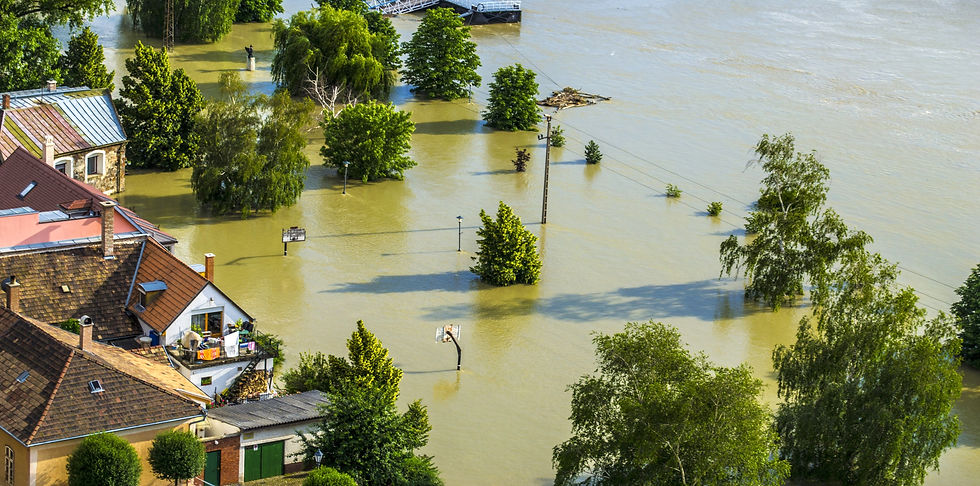4 Questions to Ask Before Buying Flood Insurance
- ppbcopywriting
- Aug 11, 2022
- 4 min read
Updated: Sep 30, 2024

Thinking about dealing with a flood isn’t anyone’s favorite way to spend an evening.
Still, life happens, and when disasters happen it’s best to be as prepared as we can for them, right?
Flooding is one of the most common, and expensive disasters that can befall a home or property owner. FEMA (the Federal Emergency Management Agency) states that, as a homeowner, there’s a 26% chance that you’ll deal with a flooding situation at least once throughout a 30-year home mortgage.
Worse, most of the damages caused in these situations aren’t covered in a standard homeowner’s policy.
Yikes!
That’s more than a 1 in 4 chance of footing the bill, and yet 90% of American homeowners still don’t have flood insurance.
The fact is, whether you’re in a high-risk flood zone or not, statistically speaking, home and building owners should consider adding flood protection to their insurance coverage.
Now, we’re not trying to sell you flood insurance (we’re not an insurance agency), but if you’re considering adding this protection to your home or other property, here are a few questions you’ll want to ask before signing up with anyone who does.
Question 1: Do I even need flood insurance?
Even though it isn’t usually a legal requirement (depending on where you live) the answer to this question is nearly always yes. Even if you live in a low-risk area, or far from the nearest body of water, flooding is still one of the most common causes of home and building damage by natural disasters.
Flooding doesn’t just mean a river is rising. Storms, snow-melt, rain, and even broken pipes (personal or communal) are all common causes of flooding and can, for the most part, happen anywhere at any time.
Add to that the fact that it only takes a few inches of flood water to wreak staggering amounts of damage on your home and personal property, and you can see why flood insurance is a recommended safety net for homeowners.
Lizzie Litzow, a spokesperson for FEMA, states in a Consumer Reports interview, “Flooding is the most common and costly natural disaster and can happen anywhere. Just 1 inch of water can cause up to $25,000 in damage to a home...”
Even in the case of a major flooding situation, you can only expect financial relief or compensation if an official state of emergency or “Federal disaster” is declared by the President. Even in these rare situations, “help” typically comes in the form of Federal loans that require repayment.
Question 2: What are my flood insurance coverage options?
Typically, you’ll have a choice between two standard insurance options.
One covers the physical structure of your home or building, the other covers its contents (your personal property.) Make sure to ask what the specific policy you’re being offered covers, and make sure that you’re getting both.
Obviously, the house itself is your largest investment and greatest potential risk, but the cost of replacing furniture, appliances, home electronics, carpeting, etc., can add up very quickly as well!
Question 3: What exactly does my flood insurance cover?
Not all flood insurance policies cover all potential flooding disasters. Avoid Murphy’s Law by knowing in advance exactly what’s being protected and what isn’t.
Common coverages include:
Essential Home Systems (furnace, AC, etc.)
Major & Built-in Appliances
Carpeting and window treatments
Permanently installed features like bookcases, and cabinets
Foundation walls, anchorage systems, and staircases
Personal property (like that furniture and electronic equipment we talked about)
Original artwork and other valuables
Be sure to ask about any other causes of flooding that you think could be specifically relevant to you as well.
Things like groundwater seepage, mudflow, storm-sewer backup, or what happens if your neighbor’s above-ground swimming pool collapses and creates a tsunami in your backyard.
Equally important is to ask what isn’t covered in the policy. Owners are often surprised by some of the exemptions or “fine print”.
These can include (but aren’t limited to):
Preexisting Damage like mildew, or mold
Earth movement (even if caused by flooding)
Temporary housing costs during repairs
Financial losses due to interruption of business
Property outside the insured building (landscaping, septic, decks, fences, etc.)
Hot tubs or swimming pools
Cash, precious metals, and financial certification (stocks or bonds)
Question 4: How can I get the best rate on my flood insurance?
Hey, it can’t hurt to ask, right?
Flood insurance premiums, depending on your specifics and the insurer you choose, can be high, and few sales folks offer you their most affordable product up front.
Ask your agent to break down the individual costs and what each covers.
Are you paying to cover an AC system when you don’t have an AC system?
Does the policy include a premium for low deductibles on high-end electronics that you don’t own?
Is there a lower square footage coverage option?
Know where each premium is coming from and then decide if you really need it. Be sure to ask how you can qualify for discounts and rate reductions as well. Things like military background, AARP and other memberships, or additional policies with the same insurer can lead to significant savings.
Feel free to ask all of these questions (and more) when considering flood insurance.
After all, you are hiring them.
If an agent or agency doesn’t seem to have your best interests at heart or isn’t willing to offer you competitive rates, move on to another agency.
After all, is that really who you want to deal with when you’re knee-deep in flood water?


